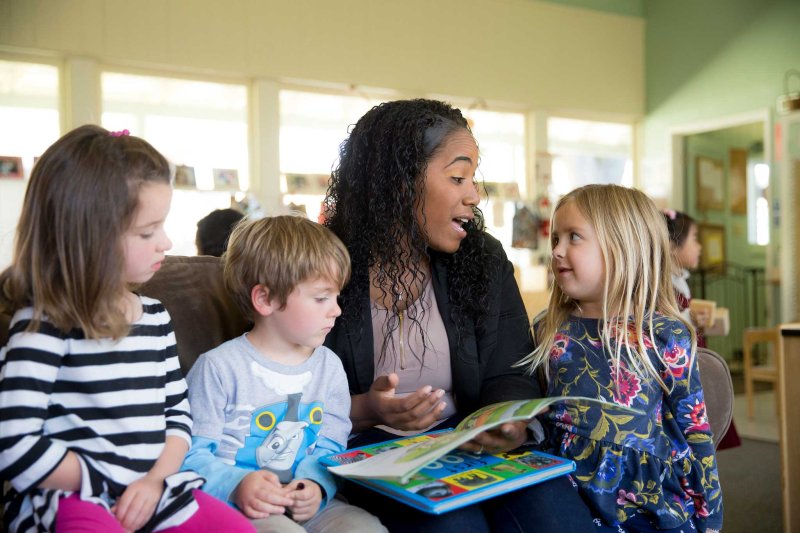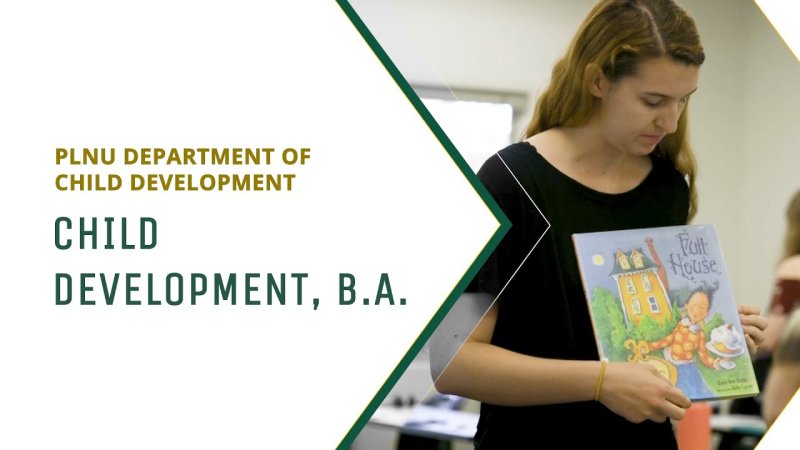
Consider the career options for caring for children from infancy through age 8.
Are You a Good Fit For a Career In Early Childhood Education?
If you love children and have ever thought about working with them for a career, consider the route of early childhood education. Focused on providing care for — and on behalf of — children from birth to third grade, early childhood education allows you to connect with students when they are the most open to learning, giving you the chance to help them be successful from kindergarten into adulthood.
Early childhood education allows you to connect with students when they are the most open to learning
Early childhood job opportunities are expected to grow over the next several years, according to the U.S. Bureau of Labor Statistics, as a large number of teachers are expected to retire and the emphasis on early childhood education increases. The estimates range from 50,000 preschool teaching jobs opening up by 2028 and more than 100,000 kindergarten and early elementary teaching jobs. Anyone who completes a degree in child development can expect a wide range of career options.
__________
Who are you called to be?
Pursue your purpose at PLNU.
__________
What You Need to Be Successful in Early Childhood Education
At a minimum, early childhood educators need a bachelor’s degree in a related field, such as child development. Through that degree, you’ll learn the ways children grow and form relationships physically, emotionally, socially, and intellectually. You’ll also be equipped with a strong understanding of typical and atypical development in children.
To be successful as an early childhood educator: You must be patient, creative, adaptable, energetic, empathetic, organized, and a strong communicator
In addition to the degree, you’ll also need to receive a teaching certification, which is granted by each state’s Department of Education, or at least some sort of approved teacher training program that involves supervised student teaching. The Child Development Associate (CDA) credential is a common certification for childcare providers, often required to work in daycares, preschools, or nursery schools. Find more information on teacher certification for early childhood education on the Council for Professional Recognition website.
Beyond the credentials, there are several soft skills you’ll need to be successful as an early childhood educator: You must be patient, creative, adaptable, energetic, empathetic, organized, and a strong communicator. If that description fits you, you might make an ideal candidate for a career in early childhood, a field ripe with rewards. In addition to the joy of seeing children thrive in their development, you may also find delight in the unexpected (any parent will tell you that no two days are the same with children), and as you find creative ways to work together to learn new skills, you’ll quickly learn how to think quickly on your feet and find new solutions.
Career Opportunities in Early Childhood Education
Working with young children opens the doors for careers in a variety of industries, from education to health care to social work.
Preschool Teacher or Director at Private, Public, or Charter School
Being successful as a preschool teacher is predicated on building a safe, secure, nurturing environment for young children to be creative and learn through play. Young children learn primarily through hands-on activities and play, so a day teaching in a preschool setting could involve games, music, art, books, and more. It will also involve helping children learn social and emotional skills, including how to get along with others so they can thrive through kindergarten and beyond.
Kindergarten and Elementary School Teacher
Just like in preschool, children undergo major developmental changes in their early elementary school years, so they need a safe and nurturing environment to grow and learn. Your responsibilities as an early elementary teacher mirror those of preschool teachers — lesson plans, daily schedules, tracking progress of students — and you’ll continue to guide the emotional and social development of students. In elementary school, though, students are frequently in and out of their regular classroom for other activities such as recess, lunch, enrichment activities, and field trips, so the role requires a good deal of supervision.
Child Life Specialist
Being a child life specialist in a hospital or other medical setting affords you the opportunity to work in the healthcare field without being a nurse or doctor. Child life specialists work with children and families to help them cope with challenges such as hospitalization, illness, and disability. You would provide children with preparation for medical procedures or surgeries, such as meditation or breathing techniques, and provide information, guidance, and support to the child’s family members.
Nanny
More formally called a “home-based service provider,” a nanny can wear a lot of hats, and the role typically depends on the family in whose home they’re providing care. Nannies generally are responsible for providing attentive, nurturing care to the children they regularly look after. It can vary from simple supervision to additional responsibilities such as grocery shopping, maintaining a clean house, and shuttling children to and from activities. Sometimes nannies are live-in positions, in which you live in the same house or on the same property so you can be available to take care of the children at all times.
Infant Teacher
You might not think there’s much “teaching” done when care for children age 3 and younger, but an infant teacher will tell you that’s not the case. As a certified, professional teacher, these educators specialize in providing that learning environment to babies and toddlers from 3 months to 3 years in age. You must be passionate about instilling values in young children, teaching them to communicate respectfully, and creating an environment where children can learn, explore, mature, and interact with others, which is essential to helping them succeed in a more structured pre-K environment.
Behavioral Analyst
In schools, behavioral analysts work with patients to overcome mental and social disabilities, such as autism and other developmental disabilities. As a behavioral analyst, you assess, evaluate, then treat students’ social, behavioral and learning problems, based on each patient’s distinct needs and development. You also advocate for those students by educating teachers, caregivers, and families about mental and social disabilities, in addition to effecting change by informing school programs related to those types of disabilities.
Early Intervention Specialist
Working within the field of special education, an early intervention specialist works with children from birth to age 4 to identify and address developmental delays. By providing assistance at the first warning signs of any educational or developmental difficulty, children show significantly lower physical, intellectual, speech, or behavioral issues in the long run. You can work in a preschool but typically visit children within their homes, and you could be employed by school districts, regional programs, or medical providers.
Childcare Consultant
When expectant or new parents are having trouble finding the childcare situation to suit their needs, that’s when a childcare consultant can step in. Your job would be to guide parents through the childcare search and hiring process, and along the way educate them on the local requirements and standards, assist families to communicate their childcare needs and preferences, offer resources, and ultimately find the right match in a childcare provider.
Family Support Specialist
A form of social work, the family support specialist career focuses on facilitating care for families in need, offering both counseling and rehabilitative services to families going through crises, such as domestic violence or caring for a disabled family member. It involves meeting with families to determine their needs, then arranging assistance through education programs, daycare, affordable housing, or food programs. Having a solid grasp of child development would help you meet the needs of the entire family.
Head Start Teacher
Through the federally funded Head Start program, which provides education, healthcare, and nutrition services to young children in low-income families, teachers can make a difference in the lives of children ages 3 to 5. You would likely supervise classrooms for pre-K students, plan lessons, and use your knowledge of child development to help students succeed in their education.
If you enjoy working with or on behalf of children, you’ll be able to find a career that matches your passions and skills
In addition to the opportunities outlined above, you could also pursue a career as a special education teacher, school counselor, researcher, teacher’s assistant, marriage and family counselor, social service worker for children, foster care provider, behavioral therapist, and parent educator. If you enjoy working with or on behalf of children, you’ll be able to find a career that matches your passions and skills.
Ready to Launch Your Career?
With so many opportunities to work with young children professionally, the time is right for pursuing a bachelor’s degree in child development. PLNU offers both a traditional undergraduate program in child and adolescent development as well as an accelerated undergraduate program for those with previous college credit who want to finish their bachelor’s degree. Take time to find out more about the program, including a course list and what to expect.
About the Author
Bethany (Leach) Mavis graduated from PLNU in 2009 with a journalism degree. She now manages marketing and content for a high-security construction company, teaches editing to journalism students as an adjunct professor, and advises the Mariner yearbook staff at PLNU.
